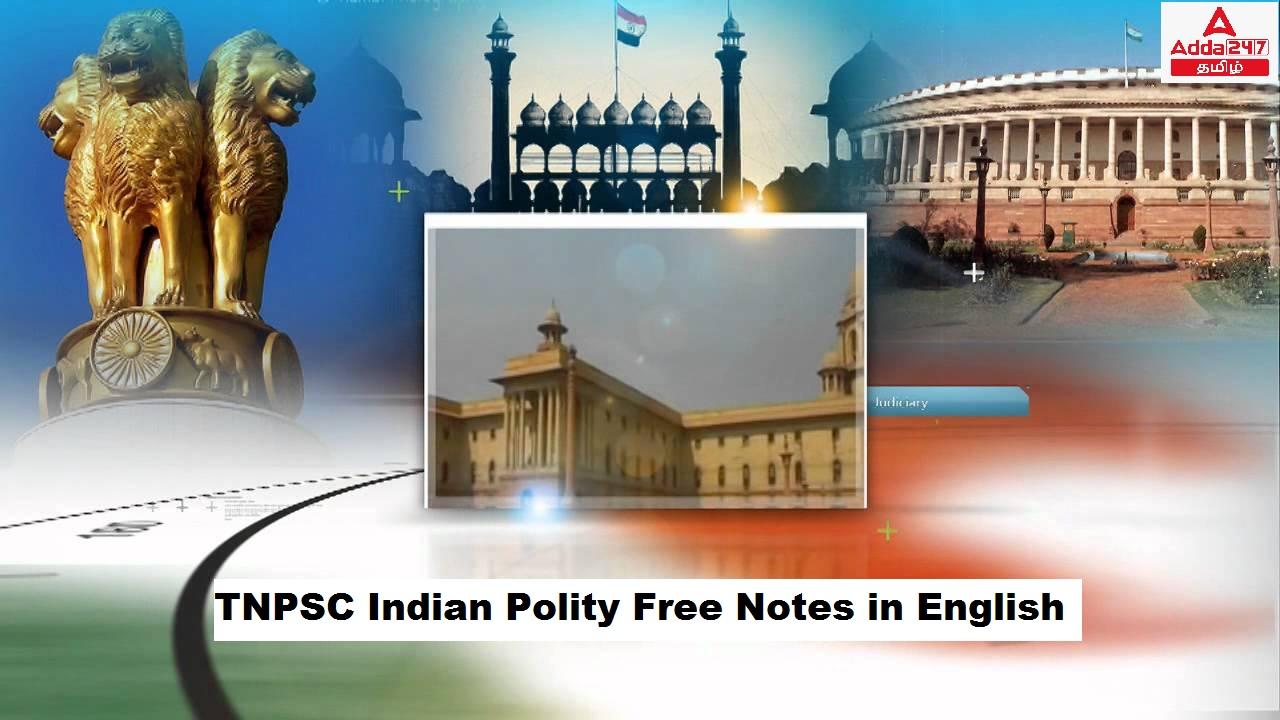இந்தக் கட்டுரையில், TNPSC குரூப் 1, குரூப் 2, குரூப் 2A, குரூப் 4 மாநிலப் போட்டித் தேர்வுகளான TNUSRB, TRB, TET, TNEB போன்றவற்றுக்கான முறைகள் இலவசக் குறிப்புகளைப் பெறுவீர்கள்.தேர்வுக்கு தயாராவோர் இங்குள்ள பாடக்குறிப்புகளை படித்து பயன்பெற வாழ்த்துகிறோம்.
State Government
Introduction
There are two sets of Government in our country – the Central government and the
State Government.
There are 28 States in our country every State has a government to run its own
administration.
The States have their own Executive, Legislature and Judiciary.
The State Executive consists of the Governor and the Council of Ministers headed by the
Chief Minister.
The Governor is an integral part of the State Legislature.
The Governor
The Constitution provides for the post of the Governor as the Head of a State in India.
He is appointed by the President of India. He is the constitutional head of a State.
The Governor is appointed for a term of five years. But before the expiry of his full term,
the President can dismiss him from office.
The Governor may also resign on his own interest. His term of office may be extended
and he may be transferred to another State.
However, the State Government cannot remove the Governor from his post.
To be the Governor, a person must be a citizen of India and should have completed 35
years of age.
And he cannot be a member of the Parliament or the State legislature. He should not
hold any office of profit.
Position of the Governor
The position of the Governor of a State is compared to the President of India as a
nominal executive. But the Governor is not always a nominal executive.
He can exercise his powers in the real sense on some occasions. He acts as an agent of
the Central Government in a State.
Therefore, he is responsible for maintaining a relation between the Central Government
and the State Government.
The Governor may advise the Council of Ministers when facing difficult situations.
The President declares emergency in a State on the basis of the report of the Governor
regarding law and order of the State.
The Governor takes independent decisions while exercising discretionary powers. He
may seek information from the Council of Ministers regarding various activities of the
Government.
The Chief Minister
The Governor appoints the leader of the majority party in the State Legislative Assembly
as the Chief Minister. He is the head of the State Council of Ministers.
The Chief Minister has no fixed term of office. He remains in the office so long as he gets
support of the majority members of the Legislative Assembly.
When he loses support in the legislature, he has to resign. The resignation of the Chief
Minister means the resignation of the whole Council of Ministers in the State.
The Chief Minister must be a member of the State Legislature. If he is not a member of
the State legislature at the time of his taking over charge, he must be so within a period
of six months.
Powers of the Governor
Introduction
The Constitution of India envisages for a federal Government, having separate systems
of administration for the Union and the States.
There are 29 States, 6 Union territories and one National Capital Territory known as
Delhi in India.
The Constitution contains provisions for the Governance of both the Union and the
States.
It lays down a uniform structure for the State Government, in part VI of the Constitution
from Article 152 to 237, which is applicable to all the States, save only the State of
Jammu and Kashmir which has a separate Constitution for its Government under Article
370.
The structure of the State Government, as formed in the Centre, consists of three
branches. They are the Executive, the Legislature and the Judiciary.
The Executive
The Governor is the Constitutional head of the State executive.
The administration of a State is carried on in the name of the Governor. Generally, there
is a separate Governor in each State but if the situation warrants the same person may
be appointed as the Governor of two or more States.
Article 154 vests the executive power of the State in the Governor.
Article 154(1) holds that the executive power of the State shall be vested in the
Governor and shall be exercised by him either directly or through officers subordinates
to him in accordance with this Constitution.
Appointment
The Governor of a State shall be appointed by the President. His usual term of office is
five years but he holds office during the pleasure of the President.
Generally, the Governor does not belong to the State where he is appointed. He can
also be transferred from one State to another by the President. He can also resign at any
time by addressing his resignation to the President.
The Legislature of a State or a High Court has no role in the removal of a Governor.
A person may be appointed as a Governor for any number of terms.
Two conventions have been set up in the matter of appointing a person as Governor of
a State. He should not be a resident of the State concerned and, the State Government
concerned is consulted and its views are sought regarding the proposed choice.
According to Article 158 (3A), where the same person is appointed as the Governor of
two or more States, the emoluments and allowances payable to the Governor shall be
allocated among the States in such proportion as the President may by order determine.
Qualification
Article 157 and Article 158 of the Constitution of India specify eligibility requirements
for the post of the Governor. They are as follows:
He should be a citizen of India.
He must have completed 35 years of age.
He should not be a member of Parliament or any State Legislature. If he is a member
of any of Legislature, he automatically vacates his seat on assuming the office.
He should not hold any other profitable occupation.
Powers and Functions of the Governor
The Governor is the head of the State Executive and he has enormous powers.
In the exercise of functions and powers, the Governor, except in certain cases, is to be
guided by the aid and advice of the Council of Ministers headed by the Chief Minister
(under Article 163). As the executive head in the State level, the Governor has the
following functions and powers.
Executive Powers
The Constitution vests all the executive powers of the State Government in the
Governor.
He may exercise this power either directly or through officers subordinate to him.
He is the Constitutional head of the State. All the administration is carried on in his
name.
The executive powers and functions of the Governor are:
He appoints the leader of the majority party in the State Legislative Assembly as the
Chief Minister of the State.
He appoints other members of the Council of Ministers on the recommendation of
the Chief Minister.
He appoints the Advocate – General of the State and determines his remuneration.
The Advocate General holds office during the pleasure of the Governor.
He appoints the Chairman and Members of the State Public Service Commission.
However, they can be removed only by the President and not by the Governor.
He appoints the State Election Commissioner and determines his conditions of
service and tenure of office.
However, the State Election Commissioner can be removed only in like manner and
on the like grounds as a Judge of a High Court.
He acts as the Chancellor of Universities in the State. He also appoints the Vice-
Chancellors of Universities in the State.
He directly rules a State when there is the imposition of the President’s rule in the
State.
Legislative Powers
The Governor is an integral part of the State Legislature. But, he is not a member in the
either house of the Legislature. In this capacity, he enjoys the following legislative
powers and functions:
He has the right to summon, prorogue the State Legislature and dissolve the State
Legislative Assembly.
He can address the State Legislature at the commencement of the first session after
each general election and the first session of each year.
He can send messages to the houses of the State Legislature relating to a bill
pending in the Legislature.
He can appoint any member of the Legislative Assembly to preside over its
proceedings when the offices of both the Speaker and the Deputy Speaker fall
vacant.
He can nominate one member to the State Legislature assembly from the Anglo-
Indian Community.
He nominates 1/6 th of the members of the State Legislative Council from amongst
the persons having special knowledge or practical experience in literature, science,
art, cooperative movement and social service.
He decides on the question of disqualification of members of the State Legislature in
consultation with the Election Commission.
Every bill passed by the State Legislature will become law only after his signature.
But, when a bill is sent to the Governor after it is passed by the Legislature, he has
the options to give his assent to the bill or withhold his assent to the Bill or return
the Bill for the reconsideration of the Legislature.
He has to reserve any Bill passed by the State Legislature which endangers the
position of the State High Court, for the consideration of the President.
He can promulgate ordinances when the State Legislature is not in session under
Article 213. But, these ordinances must be approved by the Legislature within six
months. He can also withdraw an ordinance at any time.
He has to lay the annual reports of the State Finance Commission, the State Public
Service Commission and the Comptroller and Auditor General relating to the
accounts of the State, before the State Legislature.
Financial Powers
The Constitution confers on the Governor, the duty to get prepared and introduced to
the State Legislature, the annual budget and also the supplementary budgets, if
necessary.
He causes the Annual Financial Statement (Budget) of the State to be presented in the
Legislative Assembly.
He presents through the Minister of Finance of the State the Supplementary Budget of
the State to the Legislative Assembly if there be such a need.
Money Bills can be introduced in the State Legislature only with his prior
recommendation.
No demand for any grant can be made except on his recommendation.
He can make advances out of the state Contingency Fund to meet any unforeseen
expenditure.
He constitutes a Finance Commission after every five years to review the financial
position of the panchayats and the municipalities.
Judicial Powers
He appoints the Attorney-General of the State.
He appoints Judges to the Subordinate Courts in the State.
He makes appointment, postings and promotions of the District Judges in consultation
with the State High Court.
The Chief Justice of the High Court in the State is appointed by the President in
consultation with him.
He can pardon, commute or reprieve punishment on receipt of appeals for mercy.
Discretionary Powers
The Governor can reserve a bill for the consideration of the President.
He recommends for the imposition of the President’s rule in the State.
He seeks information from the Chief Minister relating to the administrative and
legislative matters of the State.
He can call the leader of any party to form Ministry in the State when there is no clear-
cut majority to any party in the Legislative Assembly after the general elections.
He can dismiss the Council of Ministers, when it is unable to prove the confidence of the
Legislative Assembly; and
He can dissolve the Legislative Assembly if the Council of Ministers has lost its majority.
Emergency Powers
If the Governor is satisfied that the Government of the State is not carried on in
accordance with the provisions of the Constitution, he may, under Article 356,
recommend to the President to impose President Rule in that State.
As soon as President Rule is imposed, the administration of the State is carried on by
the Governor as the representative of the President.
Privileges of the Governor
Article 361(1) provides for the following privileges for the Governor;
The Governor of a State, is not be answerable to any court for the exercise and
performance of the powers and duties of his office or for any act done or purporting
to be done by him in the exercise and performance of those powers and duties.
No criminal proceedings whatsoever shall be instituted or continued against the
Governor of a State in any court during his term of office.
No process for the arrest or imprisonment of the Governor of a State shall be issued
by any court during his term of office.
**************************************************************************
| Adda247 TamilNadu Home page | Click here |
| Official Website=Adda247 | Click here |




